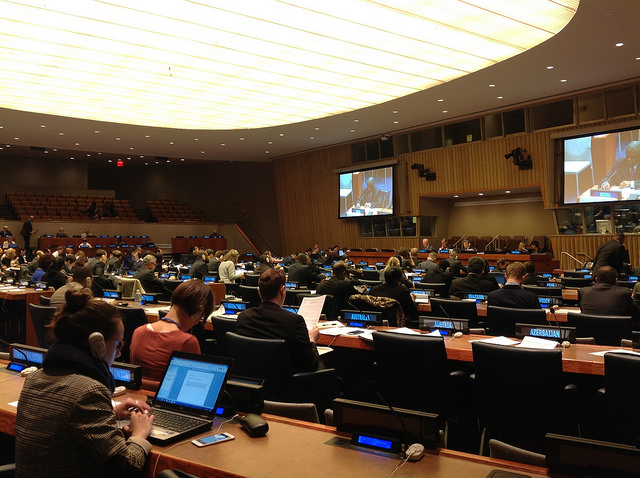
October at the United Nations in New York

The leadership of the Campaign to Stop Killer Robots will be in New York on 19-20 October to conduct outreach at the UN General Assembly’s annual First Committee on Disarmament and International Security, which opened on 8 October and is chaired by Ambassador Karel van Oostrom, permanent representative of the Netherlands to the UN in New York. Nations are not expected to take any formal decisions on autonomous weapons at this month-long meeting, but for the third year in a row, many are using the opportunity to express their views on autonomous weapons in their statements. (See the extracts posted below)
The Campaign to Stop Killer Robots calls on states to preemptively ban weapons systems that would select targets and use force without meaningful human control. It supports continued deliberations on “lethal autonomous weapons systems” at the Convention on Conventional Weapons (CCW) in Geneva in 2016, but believes it’s time for states to step-up their CCW talks on autonomous weapons by agreeing to a more substantive outcome-oriented mandate instead more informal discussions. An ambitious mandate is needed so that states can act with the urgency that this issue demands.
Since the Campaign to Stop Killer Robots was created by a small group of NGOs at a meeting in New York on 19 October 2012, it has grown into a global coalition of more than 55 NGOs. Calls to prohibit autonomous weapons have multiplied and include:
- The governments of Bolivia, Cuba, Ecuador, Egypt, Ghana, Pakistan, State of Palestine, and the Holy See. Additionally, Croatia, Ireland, Sri Lanka, and others nations that say the call for a ban must be considered;
- 21 Nobel Peace laureates including the former presidents of Poland, Costa Rica, South Africa, and Timor-Leste;
- More than 70 faith leaders of various denominations;
- Approximately 2,800 artificial intelligence and robotics experts;
- Private Canadian company Clearpath Robotics;
- The European Parliament, which adopted a resolution in 2014 calling for a ban on “the development, production and use of fully autonomous weapons which enable strikes to be carried out without human intervention.”
Campaign Activities
The Campaign to Stop Killer Robots is undertaking several activities in New York, including:
- On 16 October at 15:00, the global coordinator of the Campaign to Stop Killer Robots, Ms. Mary Wareham, who also serves as advocacy director for the Arms Division of Human Rights Watch, will deliver the campaign’s statement to UNGA First Committee. @hrw @marywareham @bankillerrobots
- On 20 October, Campaign to Stop Killer Robots representatives and guests will address a media briefing followed by a side event briefing for UN First Committee delegates in cooperation with Costa Rica. Speakers include artificial intelligence expert Professor Toby Walsh of the University of New South Wales in Sydney, Australia. Walsh helped draft and was one of the first signatories on the July 2015 artificial intelligence open letter calling for a ban on autonomous weapons. He also chairs the international committee of the executive council of the Association for the Advancement of Artificial Intelligence (AAAI).
- Bilateral meetings with government representatives and United Nations officials including the UN Secretary General’s Acting High Representative for Disarmament, Mr. KIM Won-soo
Approximately 20 representatives from the Campaign to Stop Killer Robots are attending the UNGA First Committee on Disarmament and International Security, including:
- Dr. Ian Kerr, who holds the Canada Research Chair in Ethics, Law and Technology at the University of Ottawa Faculty of Law in Canada. He also holds cross-appointments to the Faculty of Medicine and the Department of Philosophy. Kerr is a member of the International Committee for Robot Arms Control (ICRAC) and signatory to the July 2015 artificial intelligence open letter calling for a ban on autonomous weapons. @ianrkerr @icracnet
- Mr. Richard Moyes, managing partner at Article 36, a UK-based NGO that published an influential memo in 2013 proposing a focus on meaningful human control of autonomous weapons technologies. @rjmoyes @Article36
- Philosopher of technology Dr. Peter Asaro, vice-chair of the International Committee for Robot Arms Control, who directs Graduate Programs at the School of Media Studies at The New School for Public Engagement. @peterasaro @icracnet
- Dutch humanitarian disarmament campaigner Ms. Miriam Struyk of PAX, who leads outreach efforts in the Netherlands and produced the campaign’s first short animated film. @MiriamStruyk@PAXforpeace
- Director of the arms division of Human Rights Watch, Mr. Steve Goose, and senior researcher Ms. Bonnie Docherty, author of the 2012 report Losing Humanity and other publications detailing legal, ethical, and other concerns with autonomous weapons. @SteveDGoose @hrw
- The director of Ottawa-based Mines Action Canada, Mr. Paul Hannon, and Ms. Erin Hunt. Ahead of the country’s general election on 19 October, MAC has published a survey of Canadian political party views on disarmament challenges including the call to ban autonomous weapons. @PCHannon @erinlynnhunt @MinesActionCan
- Ms. Ray Acheson, director of the Reaching Critical Will project of the Women’s International League for Peace and Freedom (WILPF), which celebrated its 100th anniversary earlier this year. Ms. Mia Gandenberger from WILPF’s Geneva office will also attend. @MiaKatGan
For more information, see
- Campaign to Stop Killer Robots media advisory and UNGA side event flyer
- Reaching Critical Will website on UNGA First Committee including statements and 2015 briefing book chapter on killer robots
- Web stories from the campaign’s 2014 UNGA outreach (6 October and 28 October) and outreach in 2013 (21 October, 23 October, 31 October)


